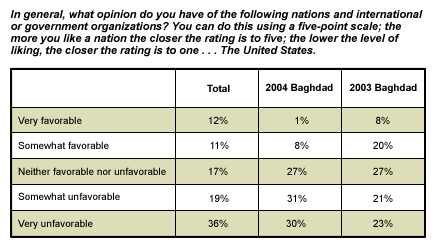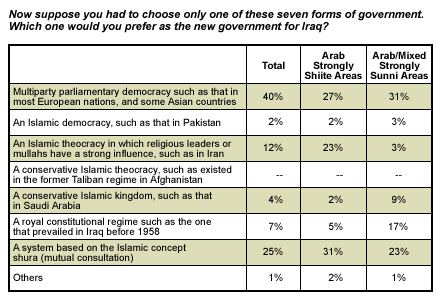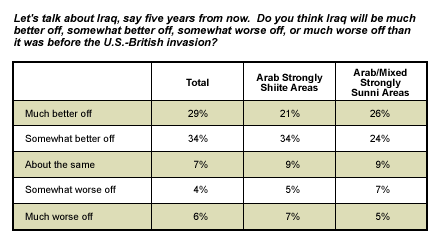Gallup, in partnership with CNN and USA Today, conducted 3,444 70-minute, in-home, in-person interviews with a nationally representative sample of Iraqis in 350 separate locations throughout the country in late March and early April 2004. The resulting data offer a wealth of insight on the current climate of opinion among Iraqis nationwide. Following is the second in a series of ���۴�ýPoll Tuesday Briefing articles discussing the findings. (See Related Items.)
Assessments of America, Its Intent, Good Faith, and Commitment
Roughly a quarter of all Iraqis hold a favorable image of the United States (11% somewhat favorable, 12% very favorable), while at least one in three Iraqis express a very unfavorable appraisal (36%). The favorability ratings accorded to America's leading coalition partner, Britain, are nearly identical.
Furthermore, America's nationwide favorability ratings are inflated by the uniquely positive assessments provided by residents of Kurdish Sulaymaniyah, a province that was effectively self-governing for more than a decade before last spring's invasion. Within Sulaymaniyah, fully 96% give America a very (74%) or somewhat (22%) favorable assessment; outside the Kurdish northeast, just one in every eight Iraqis rate the United States positively (9% somewhat favorable, 3% very favorable).
In Baghdad -- home to a quarter of Iraq's population -- Gallup's polling indicates that America's image has declined sharply in recent months. In September 2003, our survey of Baghdad residents revealed that at least a quarter had either a somewhat (20%) or very (8%) favorable opinion of the United States. That proportion has fallen to just 1 Baghdadi in 10 in the current survey (8% and 1%, respectively).

Assessments of America's good faith and commitment are also harsh. Nationwide, only minorities say they agree with assertions that:
- The United States will allow Iraqis to design their own
political future as they see fit, without direct U.S. interference
(28% agree, 57% disagree).
- The United States is very serious about establishing a
democratic system in Iraq (37% agree, 50% disagree).
- The United States is very serious about improving the economic
lot of the Iraqis (37% agree, 54% disagree).
- The United States is completely serious about preserving the political and geographical unity of Iraq (33% agree, 51% disagree).
There is also concern about America's long-term intent: More than half (55%) say they agree with the assertion that "The U.S. will not leave Iraq unless it is forced to do so by Iraqis" (28% disagree).
Broad Support for a Democratic Form of Government, Constitutionally Guaranteed Freedoms
Notwithstanding any skepticism they may have expressed concerning America's determination to help establish it, Iraqis express strong support for a democratic form of government in Iraq. Iraqis strongly agree (84%) that what the country needs is "an Iraqi democracy."
More than half (54%) say that "a multiparty parliamentary democracy such as that in most European nations, the U.S., and some Asian countries" is acceptable to them -- a higher level of acceptance than is expressed for any of the other six possible models tested. In addition, significantly more Iraqis say they would prefer this model to any other single choice. The 40% who opt for a parliamentary democracy outnumber the 25% who say they would prefer "a system based on the Islamic concept of ‘shura' (consultation)," the 12% who want "an Islamic theocracy in which religious leaders or mullahs have a strong influence, such as in Iran," or the 7% who want "a royal constitutional regime such as the one that prevailed in Iraq before 1958." Fully half of Iraqis (50%) think a parliamentary democracy is the form of government Iraq is most likely to have five years from now -- royal constitutional regime was the second most-offered response, at just 7%.
There are, admittedly, some differences across sectarian lines. In the most strongly Shiite areas, a system based on the Islamic concept of shura is slightly more likely to be preferred (31%) than is a multiparty parliamentary democracy (27%). In strongly Sunni areas, a multiparty parliamentary democracy is preferred to a shura-based system, 31% to 23%. But the single most common expectation among both groupings is that Iraq will be a multiparty parliamentary democracy five years from now (expectation in strongly Shiite areas: 42%, strongly Sunni: 37%).

Equally important is the widespread support for the inclusion of certain basic guarantees once the country drafts a new constitution. The interim "Transitional Administrative Law" drafted and signed in early March pledges guarantees of freedom of speech, freedom of religious exercise, and freedom of assembly. Strong majorities say they believe the new constitution should guarantee:
- Freedom of speech -- allowing all Iraqi
citizens to express their opinions on the political, social, and
economic issues of the day (94% agree, 2% disagree with this
guarantee)
- Freedom of religion -- allowing all Iraqi
citizens to observe any religion of their choice, and to practice
its teachings and beliefs (73% agree, 22% disagree)
- Freedom of assembly -- allowing all Iraqi citizens to assemble for any reason or in support of any cause (77% agree, 12% disagree)
From June 30 Until Elections: A Caretaker Government With Limited Powers?
To what body will the CPA return sovereignty on June 30? Given the failure to organize elections, it has been assumed for months that the single most likely entity would be the Iraqi Governing Council (IGC) -- perhaps with its current membership enlarged by way of additional appointments.
Earlier this week, however, U.N. special envoy Lakhdar Brahimi advanced the notion of an interim Iraqi government whose principal figures might be chosen after consultations between the United Nations, coalition governments, and Iraqi dignitaries. This government would serve in a "caretaker" role, and would exercise authority only until it could organize and conduct nationwide elections next year.
What would be the perceived legitimacy of such a caretaker body, and do Iraqis perceive it as a preferable alternative to handing power to the current (or expanded) IGC?
���۴�ýtested the relative attractiveness of these same three options with Iraqis. The majority (58%) who say they would prefer sovereignty to be transferred to "a caretaker Iraqi government with limited powers, whose main responsibility would be to arrange and conduct elections" strongly outnumbered those who expressed a preference for handing power to either "the current 25-member Iraqi Governing Council" (11%) or "an expanded 50-member Iraqi Governing Council, whose additional members would be selected jointly by the current IGC and the CPA" (9%), with 18% unsure and 2% suggesting other options.
In short, there appears to be considerable popular receptivity in Iraq to taking an approach broadly similar to that now advocated by the U.N. envoy -- far broader, at least, than that extended to the other most commonly proposed options.
Long-Term Optimism Remains
Although Iraqis are divided on whether their country is currently better (42%) or worse (39%) off than before last spring's invasion (see "���۴�ýPoll of Iraq: Liberated, Occupied, or in Limbo?" in Related Items), there is striking optimism regarding the country's long-term future following the return of sovereignty on June 30.
Nearly two-thirds of all Iraqis (63%) say they believe their country will be either somewhat (34%) or much (29%) better off five years from now than it is at present, while just one Iraqi in 10 foresees the country being worse off five years hence (4% somewhat worse off, 6% much worse off). Also worth noting is the fact that these positive expectations were expressed by Shiites and Sunnis alike. More than half (55%) of those living in strongly Shiite areas say they expected Iraq to be better off five years from now (21% much, 34% somewhat), as did half (50%) of all those living in strongly Sunni areas (26% much, 24% somewhat). And a mere 12% of those in either grouping say they expected Iraq to be worse off five years from now (those in strongly Shiite areas: 5% somewhat worse, 7% much worse; those in strongly Sunni areas: 7% somewhat worse, 5% much worse).

Iraqis' expectations for the fates of their own regions are similarly optimistic: 65% see their governorate (province) as being better off five years from now (37% somewhat better, 28% much better), and just 8% think it will be worse off (4% somewhat worse, 4% much worse).
Iraqis are also optimistic about their own personal futures. Each adult ���۴�ýinterviewed was shown a depiction of a mountainside, with 10 "step" points marked along its slope. The top (10), they were told, represented "the best possible life you can imagine," and the bottom (1) "the worst possible life you can imagine." They were asked to point to the step they felt best represented the quality of their own lives at present, where they felt their lives stood five years ago, and finally on which step they thought they would stand five years from now. The average (mean) rating given for current quality of life on this 10-point scale was 4.7 -- a middling rating, perhaps, but still somewhat higher than the average of just 3.8 given for the quality of one's personal life five years earlier.
However, the average prediction given by Iraqis for where their quality of life would stand five years from now was 6.4 -- a significant expected improvement over the current average rating of 4.7.
In Coming Issues…
Over the next weeks and months, subscribers to The Gallup Poll Tuesday Briefing will receive exclusive access to additional analysis from this uniquely comprehensive survey of public sentiment in Iraq. For example:
- What do Iraqis think about the prospective trial of ousted
dictator Saddam Hussein? Do they believe him to be guilty or
innocent of various possible charges against him, and if found
guilty, what sentence do they think he should
receive?
- How widespread among Iraqis is the fear of a possible civil
war?
- Are the rights of women likely to be in jeopardy under Iraq's
next legal code and constitution?
- What degree of autonomy, if any, should be granted to Iraq's
predominantly Kurdish areas?
- What is Iraqis' current image of various international leaders, including President George W. Bush and British Prime Minister Tony Blair?
